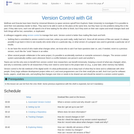
This lesson is part of the Software Carpentry workshops that teach how to use version control with Git. Wolfman and Dracula have been hired by Universal Missions (a space services spinoff from Euphoric State University) to investigate if it is possible to send their next planetary lander to Mars. They want to be able to work on the plans at the same time, but they have run into problems doing this in the past. If they take turns, each one will spend a lot of time waiting for the other to finish, but if they work on their own copies and email changes back and forth things will be lost, overwritten, or duplicated. A colleague suggests using version control to manage their work. Version control is better than mailing files back and forth: Nothing that is committed to version control is ever lost, unless you work really, really hard at it. Since all old versions of files are saved, it’s always possible to go back in time to see exactly who wrote what on a particular day, or what version of a program was used to generate a particular set of results. As we have this record of who made what changes when, we know who to ask if we have questions later on, and, if needed, revert to a previous version, much like the “undo†feature in an editor. When several people collaborate in the same project, it’s possible to accidentally overlook or overwrite someone’s changes. The version control system automatically notifies users whenever there’s a conflict between one person’s work and another’s. Teams are not the only ones to benefit from version control: lone researchers can benefit immensely. Keeping a record of what was changed, when, and why is extremely useful for all researchers if they ever need to come back to the project later on (e.g., a year later, when memory has faded). Version control is the lab notebook of the digital world: it’s what professionals use to keep track of what they’ve done and to collaborate with other people. Every large software development project relies on it, and most programmers use it for their small jobs as well. And it isn’t just for software: books, papers, small data sets, and anything that changes over time or needs to be shared can and should be stored in a version control system.
- Subject:
- Applied Science
- Computer Science
- Information Science
- Mathematics
- Measurement and Data
- Material Type:
- Module
- Provider:
- The Carpentries
- Author:
- Alexander G. Zimmerman
- Amiya Maji
- Amy L Olex
- Andrew Lonsdale
- Annika Rockenberger
- Begüm D. Topçuoğlu
- Ben Bolker
- Bill Sacks
- Brian Moore
- Casey Youngflesh
- Charlotte Moragh Jones-Todd
- Christoph Junghans
- David Jennings
- Erin Alison Becker
- François Michonneau
- Garrett Bachant
- Grant Sayer
- Holger Dinkel
- Ian Lee
- Jake Lever
- James E McClure
- James Tocknell
- Janoš Vidali
- Jeremy Teitelbaum
- Jeyashree Krishnan
- Jimmy O'Donnell
- Joe Atzberger
- Jonah Duckles
- Jonathan Cooper
- João Rodrigues
- Katherine Koziar
- Katrin Leinweber
- Kunal Marwaha
- Kurt Glaesemann
- L.C. Karssen
- Lauren Ko
- Lex Nederbragt
- Madicken Munk
- Maneesha Sane
- Marie-Helene Burle
- Mark Woodbridge
- Martino Sorbaro
- Matt Critchlow
- Matteo Ceschia
- Matthew Bourque
- Matthew Hartley
- Maxim Belkin
- Megan Potterbusch
- Michael Torpey
- Michael Zingale
- Mingsheng Zhang
- Nicola Soranzo
- Nima Hejazi
- Oscar Arbeláez
- Peace Ossom Williamson
- Pey Lian Lim
- Raniere Silva
- Rayna Michelle Harris
- Rene Gassmoeller
- Rich McCue
- Richard Barnes
- Ruud Steltenpool
- Rémi Emonet
- Samniqueka Halsey
- Samuel Lelièvre
- Sarah Stevens
- Saskia Hiltemann
- Schlauch, Tobias
- Scott Bailey
- Simon Waldman
- Stefan Siegert
- Thomas Morrell
- Tommy Keswick
- Traci P
- Tracy Teal
- Trevor Keller
- TrevorLeeCline
- Tyler Crawford Kelly
- Tyler Reddy
- Umihiko Hoshijima
- Veronica Ikeshoji-Orlati
- Wes Harrell
- Will Usher
- Wolmar Nyberg Åkerström
- abracarambar
- butterflyskip
- jonestoddcm
- Date Added:
- 03/20/2017